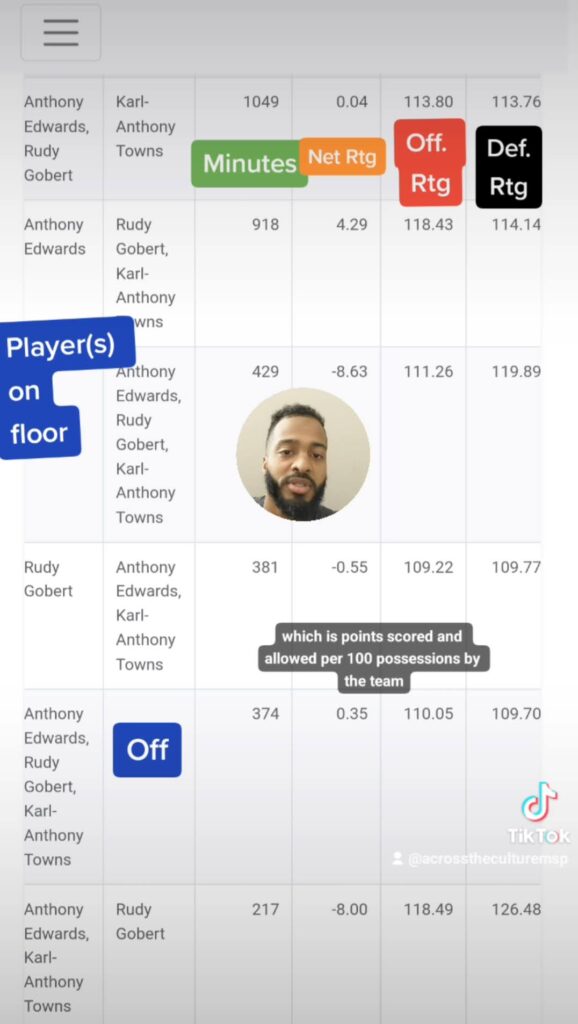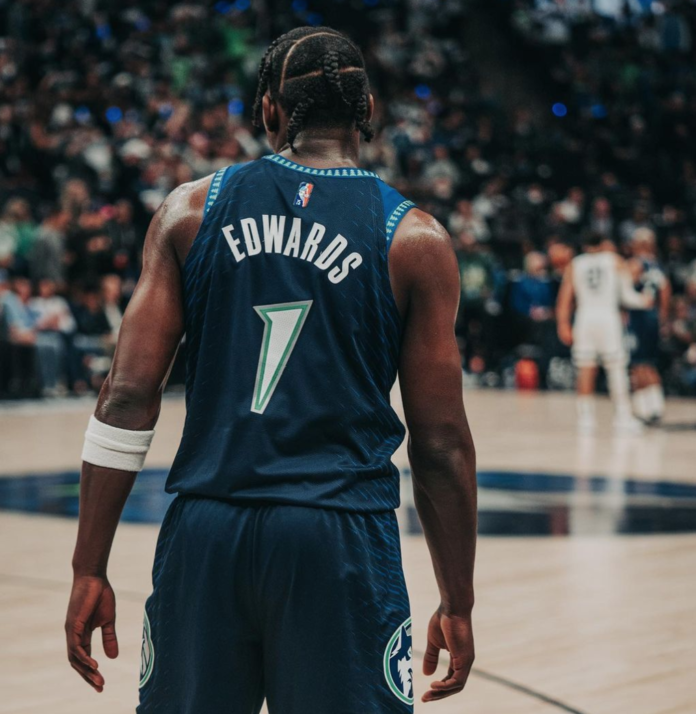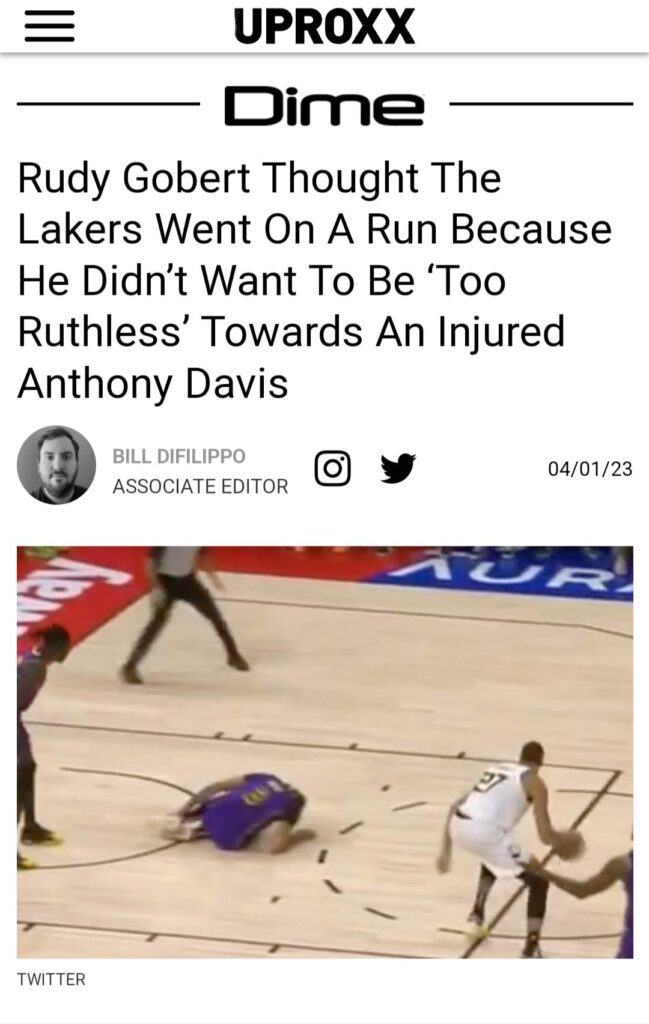This article was originally published via Across The Culture: Minneapolis Saint Paul (ATC MSP), our first local branch. Visit ATC MSP for this piece and more provocative insight into Twin Cities culture
***
This was going to be a piece focused on the Timberwolves historic lack of leadership from star players and Anthony Edwards’ chance to change that. But how can a lack of leadership be discussed without the context of team culture?
I began again, researching the failure of the Timberwolves to build and sustain a winning culture. Looking back at the 2021-2022 roster reminded me that for a moment, they may have actually had something worthwhile. Then they traded their most culture-shifting players (and much more) for a high-profile yet limited center who quite literally gets in the way of their best players.
With so many parts just not quite working, let’s step back and address the whole: what the hell are the Timberwolves? What are they working toward in this moment? Why does it seem like no matter what the answer to the last question is, they aren’t going to make it?
Who are the Minnesota Timberwolves?
The Wolves are many things: a humbly optimistic expansion franchise, one of six teams to never appear in the Finals, a small-market team that aims for decent yet underperforms, a team whose star players historically do better once they leave, a franchise historically bad at the Draft, and a franchise with no defining characteristic aside from losing (at least the Hornets have popular announcers).
What are the Wolves trying to do?
Well, when a team ships off a third of its roster and five picks for one established player, the idea is they’re trying to win now. The phrase “win now” tends to mean championship-or-bust aspirations, but for the Timberwolves it means replicating the success of … the Utah Jazz.
“If we got a six-year run like [the Gobert-era Jazz] with this group, we would be thrilled.”
– Wolves Head Coach Chris Finch (2022)
You know what they say: if you shoot for the second floor window, you can miss and land right back to where you started.
More seriously, establishing any kind of winning pattern is an understandable goal for the Timberwolves. What’s frustrating as an observer of this team is that achieving the level of the 2016-2017 Jazz doesn’t have to include that Jazz team’s co-star who appears past his prime and doesn’t mesh well with the Wolves’ franchise player.
Why are they struggling?
In theory, a consistent run at the playoffs — even if the era peaks at a second-round exit — would alter the team’s trajectory by elevating the Wolves’ reputation and giving fans and the front office enough to work with for years to come. In reality, the theory has failed at every step.
Even if we ignore the quietly big losses of players like Patrick Beverly and Jared Vanderbilt (both of whom immediately improved their new teams), the predicted benefits of a big-name defensive anchor have either been limited or non-existent.
The Timberwolves are on pace to finish the season 10th in defensive rating, modestly better than last year’s ranking of 13th. Karl-Anthony Towns — the guy Gobert was supposed to help the most — is actually playing worse offensively when he shares the court with Rudy. Any offensive stat of his worth mentioning is considerably lower than last year including PPG, 3-point percentage (from 41 to 32), eFG%, and his worst offensive rating since his rookie season.
While KAT has hit yet another rough patch in his *checks notes* 8th season with the Wolves, Anthony Edwards — the guy drafted to be the next franchise player — has confidently stepped into his role. Ant’s biggest challenge? Arguably, playing with Rudy Gobert.
The Edwards-Gobert pick-and-roll is among the worst scoring duos in the league, Gobert’s position in the paint has limited Edwards’ drives to the basket, and Ant’s offensive rating goes up dramatically when Rudy Gobert is off the floor. While the Wolves have found some success with Gobert in certain lineups, making their only player with household-name potential adjust his game for a limited defensive center is insane.

Despite also being a lumbering beast of a man, Steven Adams is a great counterexample of a traditional center making life easier for a young superstar guard with smart screening, passing, and simply knowing when to get out of the way. It’s not that a defensive-minded 5 can’t pair with Edwards, it’s that Rudy Gobert can’t pair with Edwards because every aspect of his game that isn’t a strength is a weakness they both have to share. There is no way this is supportive to a third-year All-Star guard on the cusp of superstardom who still struggles with shot selection, assertiveness, and consistency.
In short, elite defensive specialist Rudy Gobert has helped the Wolves become only a little better on defense, has not helped the old franchise player improve, and is blocking the shine of the new franchise player. How exactly will this formula yield better results over time?
A Pack With No Alpha
Giving and adjusting so much for a player who doesn’t get buckets is another big bullet point in a long list of examples showing the Wolves’ inability to team build and help star players succeed. Historically, the Wolves either give the keys to the wrong player and/or do nothing to support their anointed one after putting the weight of perennial loserdom on their shoulders.
Kevin Garnett did everything he possibly could. Eight years of playoff basketball, an MVP, and two wins away from the Finals is still powerful nostalgia for a franchise that has little else to celebrate.
Kevin Love’s unbelievable production masked an inability to bear the number-one-guy burden. In fairness to Love, he was the only guy for most of his time in Minnesota.
Andrew Wiggins’ scouting report was littered with questions about his mentality, but the Wolves traded for him anyway and put him right in the petri dish for everyone to scrutinize. When it turned out he couldn’t even lead the team to the playoffs (let alone an actual postseason run), Wiggins was tossed out as damaged goods to a much more competent franchise where he rejuvenated his career.
Packaging future All-Star Zach Lavine in a trade for established All-Star Jimmy Butler, once again, looked good on paper until the fine print: a confrontational leader fresh from a battle with his last co-star joining a roster led by notoriously passive youngsters buckling under the pressure of a franchise’s hopes.
For a few years now, Karl-Anthony Towns — in his supposed prime — has quietly been pushed out of the Best Big Man conversation. Since giving himself the title of best shooting big man of all time and confidently asserting “We in Minnesota now” en route to a swift, disappointing, and memeworthy playoff exit, it has become clear that KAT’s game plateaued and his leadership has proven unreliable. Meanwhile, his peers at both the 4 and 5 positions such as Jokić, Embiid, Antetokounmpo, and Anthony Davis have noticeably grown as players and leaders year after year with team results to show for it.
Look no further than the crucial March 31 matchup against the Lakers. Somehow, Anthony Davis’ 3rd quarter ankle injury swung momentum toward the Lakers who were down eight at the time and won by 12. Davis finished with 38 points and 17 boards including 18 points in the 4th quarter while Towns finished with a comparatively humble 23 and 8. The Lakers leapfrogged into 7th place and pushed the Wolves into 9th in a competitive last leg of the Western Conference playoff race.
Rudy Gobert later blamed himself for refusing to be “too ruthless,” highlighted by the avoidance of a shot attempt past a fallen Davis and poor team play after the Davis injury. Jon Krawczynski of The Athletic reported on an illness “ravaging” the Wolves which affected player availability and performance. But with Anthony Davis outplaying KAT after his ankle injury, a report on KAT claiming the flu “hit him hard” is just annoying and likely a little maddening if you’re a Wolves supporter.
Time and time again, decision-makers in the Timberwolves organization reveal they don’t know who they’re working with. Within the Wolves organization and some of the fandom, “winning” is understood as a purely logical outcome achieved by having the best available talent. “Chemistry” is seen as something that grows naturally if you keep people around long enough and no one is overtly toxic. “Team culture” is vaguely good vibes and no drama, and every few seasons a new first-round draft pick is expected to revolutionize the Wolves without anything else revolutionary happening around him.
The Wolves franchise and its supporters have demonstrated these naïve beliefs in many ways over the years including a persistent “next season” mentality, keeping underwhelming players and coaches for too long, and expecting new personnel to give them an identity rather than taking the time to create one. While the franchise’s lack of history is no one’s fault, that hasn’t stopped expansion teams like the Heat, Raptors, and Magic from assembling unique teams that have either reached or won the NBA Finals.
Anthony Edwards is just the latest face-of-the-franchise level talent to play in Minnesota. What makes him special, however, is that he’s actually making progress in a way the last few main guys never did. Edwards is also set apart from his Wolves predecessors as someone with true team-carrying personality traits including charisma and unshakeable confidence.
With such a delicate, ready-to-bloom prospect in Edwards, why are the Wolves allowing Rudy Gobert to block the sun? Will the Wolves respectfully part ways with KAT? And if Anthony Edwards has a moment of frustration and demands better from this clumsily-built basketball team, will he be seen as a leader with a sense of urgency or a disruptor that needs to go?
***
Who are the Wolves? What are they going to do now? And how long will it take for fans to get tired of “2017 Utah Jazz” being the big vision? Hopefully soon, before Alex Rodriguez empties the Target Center and Anthony Edwards is in a Sonics jersey.

